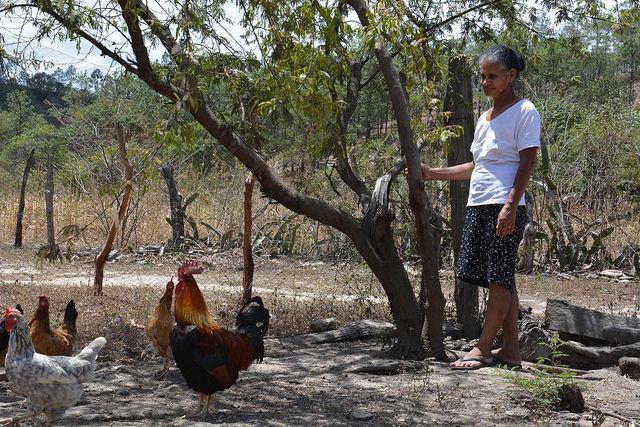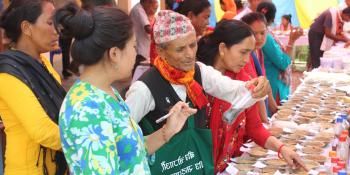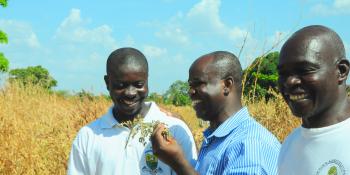Research and rural women: CCAFS researchers share their work and its impact
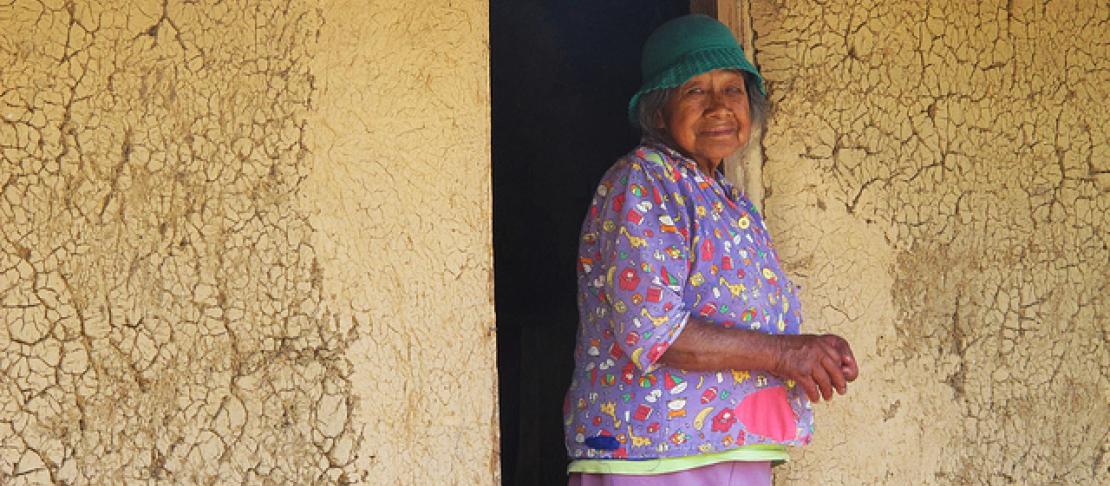
In observance of the International Day of Rural Women, CCAFS researchers share how their work supports and collaborates with rural women, families, and communities.
Rural women underpin agricultural-based communities around the world, as their labor contributes significantly to development and household food security and income. The International Day of Rural Women (IDRW) began in 2008 to celebrate the contributions of rural women around the world.
Today we are sitting down with four researchers from the CGIAR Research Program on Climate Change, Agriculture and Food Security (CCAFS) to discuss their work, the contributions of rural women, and how research and policy help both women and men adapt to climate change. They are:
- Dr. Patricia A. Bamanyaki, Visiting Scientist, Policy Action for Climate Change Adaptation at the International Institute of Tropical Agriculture (IITA)
- Dr. Tatiana Gumucio, Postdoctoral Research Scientist, CCAFS Flagship Programs on Climate Services and Safety Nets, and Gender and Social Inclusion
- Dr. Todd Crane, Climate Adaptation Scientist, International Livestock Research Institute (ILRI)
- Dr. Katie Tavenner, CGIAR Gender Postdoctoral Fellow, ILRI
What are you currently working on?
Dr. Patricia A. Bamanyaki (PAB): With funding from CCAFS, and in collaboration with CIAT Kenya, we are implementing a three-year Policy Action for Climate Change Adaptation (PACCA) project (2018-2020), to provide the Ugandan and Ethiopian governments with scientific evidence to support policy action for gender- and nutrition-sensitive climate-smart agriculture (CSA).
Dr. Tatiana Gumucio (TG): I am developing guidance materials to integrate gender considerations into climate services research design and project outcomes.
Dr. Todd Crane (TC): The USAID-funded Local Governance and Adaptation to Climate Change project highlights how adaptive capacity is socially differentiated by gender and social characteristics like ethnicity, wealth, and age. This has important implications for adaptation interventions, which can sometimes be blind to the gendered nature of agricultural and pastoral livelihoods practices.
Dr. Katie Tavenner (KT): I am currently leading a paper on gendered decision-making trends in commercializing and diversifying smallholder farm systems in East Africa. Understanding the relationships between smallholder agricultural, livestock activities, and intrahousehold gender equity is crucial to the design and focus of our work.
CCAFS works with farmers in Honduras to test insurance feasibility.
Photo: J.L. Urrea (CCAFS)
Give an example of how your work/research has impacted rural women.
PAB: We have ensured rural women’s voices are considered, especially in regards to their unique challenges, including agricultural value chains and their interplay with climate change, nutrition needs, climate change coping mechanisms and adaptation strategies, and suggestions to improve the status quo.
TG: While the materials I’m working on are new, other similar types of guidance materials that I contributed to have supported the integration of gender in policymaking and planning for natural resource management.
KT: This month I am publishing a photobook with Bioversity International, titled: Women’s Hidden Harvest: Indigenous Vegetables and AmaXhosa Cultural Survival in Hobeni Village, South Africa. The photobook documents my research on AmaXhosa rural women’s struggles to protect their traditional knowledge and the harvesting, culinary, and spiritual practices associated with indigenous vegetables in South Africa’s protected areas system.
How do rural women contribute to research priorities?
PAB: Rural women play a fundamental role in global agricultural growth and development through their contributions to agricultural labor and production. Agricultural productivity and climate change resilience research must take the views, needs, and priorities of rural women into consideration.
TG: Gender-sensitive participatory action research methodologies allow rural women to contribute to aspects of the research project cycle, from baseline assessment to indicator development. Rural women also contribute to research priorities when organizations representing their interests are included as research partners.
TC: Rural women assert their own agency in climate change adaptation processes, which forces researchers to acknowledge and engage with women as dynamic actors.
KT: Rural women constitute a significant number of the world’s agriculturalists, livestock keepers, and biodiversity conservationists. Although they have often been problematically cast as either monolithic victims or idealized as environmental steward-saviors, rural women do, in many cases, bear the burdens of agricultural progress and innovation without necessarily reaping commensurate benefits. Researching the cultural norms and gender dynamics that pattern how farmers participate in and benefit from climate change adaption and mitigation is necessary to identify the social trade-offs associated with climate action.
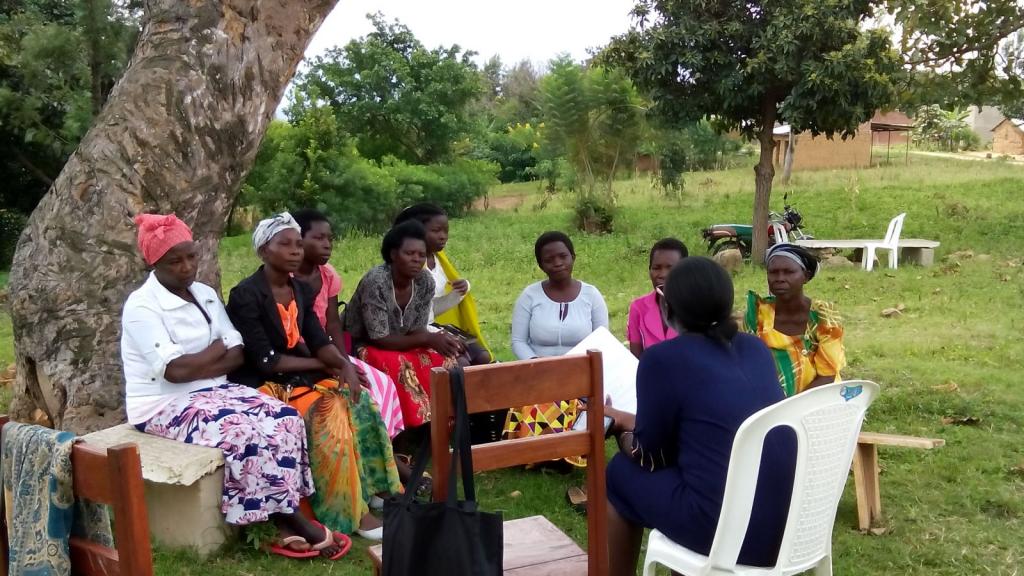
Women farmers in Lukhonge subcounty, Mbale District, Uganda
Photo: John Francis Okiror, PACCA Communications Officer
What do rural women need to be successful in climate change adaptation? What role does CGIAR play in making this happen?
PAB: Impediments to rural women’s adoption of CSA are multi-dimensional and compounded by deeply entrenched cultural norms and traditions which do not favor gender equality. For successful climate change adaptation, governments must address rural women’s land tenure security, financial inclusion, gender-sensitive extension service delivery, and investment in infrastructure.
TG: While rural women are agents of change, significant shifts in long-standing trends are important for enhanced adaptive capacity. A redistribution of key productive resources, services, and technologies must take rural women’s preferences and needs into account and recognize the heterogeneity of rural women. The CGIAR plays an important role by carrying out gender-transformative research and knowledge-sharing, involving representatives of rural women and men, as well as diverse partners, to promote the structural changes necessary.
TC: The CGIAR needs to look beyond its typical comfort zone of technology diffusion to include interventions that address gender norms that shape women’s ability to engage in climate change adaptation.
KT: While rural women face similar challenges, referring to them as a homogenous group ignores the social differences between women and gendered power relations. Gender power dynamics are embedded in climate change adaptation processes and cannot be analyzed without an understanding of the localized social intersections of power. CGIAR gender research can contribute to successful climate change adaptation by listening to the voices of rural women and men at these intersections and incorporating their perspectives into research agendas.
Further reading:
- Photo Story: CGIAR scientists share their work with rural women
- Blog: Woman to woman: Women scientists share how their work is helping women and girls succeed in agriculture
- Blog: Women take the lead on climate-smart agriculture
Kathlee Freeman is a Communications Consultant for CCAFS Gender and Social Inclusion.

